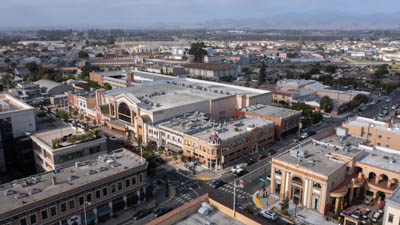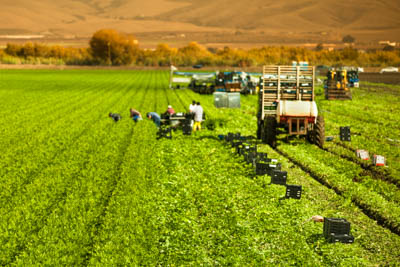The Institute for Social Transformation recently received a $650,000 grant from The James Irvine Foundation to conduct community-engaged research and community capacity-building work in the city of Salinas, located about 40 miles southeast of UC Santa Cruz. From June 2022 through Nov. 2023, the institute will partner with the Salinas Inclusive Economic Development Initiative (SIEDI), a collective of nine community organizations, in an effort to shift the region’s economic landscape to reduce inequality and improve financial stability and quality of life for local families.
The city of Salinas is one of five “priority communities” in California—alongside Fresno, Riverside, San Bernardino, and Stockton—that the Irvine Foundation has identified as having less diversified economies and a disproportionate number of low-paying jobs, with the majority of low-wage workers being people of color. The foundation’s grants in these communities are aimed at increasing economic advancement opportunities for workers through creation of new, better-paying jobs with worker protections, benefits, and pathways to advancement.
The Institute for Social Transformation was a natural partner for this work in Salinas in part because of director Chris Benner’s expertise as a scholar of equitable economic development. Benner, a Professor of Sociology and Environmental Studies, has been working for the past 20 years with a colleague at the University of Southern California to develop a framework for how to address inequality, social divisions, and ecological destruction by bolstering aspects of our economy that are built upon mutuality and collaboration.
The 2021 book Solidarity Economics: Why Mutuality and Movements Matter, lays out the theory and strategies behind this approach. And now, the new grant-funded work with SIEDI will offer an opportunity to apply and refine those principles in partnership with the community.
As part of that work, The Institute for Social Transformation will join SIEDI in a planning process to set specific indicators—based on the group’s goals for economic transformation in the region—that can be used to track progress on a neighborhood, city, and regional scale. The institute will then evaluate data availability around these indicators, with the hope of creating an online economic analysis tool to support the work of SIEDI members.
“This type of data is powerful for a variety of reasons,” Benner explained. “It’s useful in showing trends and conditions in our economy, but it's also powerful as a way of promoting dialogue, connection, and understanding. And that’s most effective when data is in the hands of stakeholders: people who care and are trying to promote an inclusive economy in the region.”
The institute will also work to develop an interactive “power mapping” tool for SIEDI, which will help community organizations visualize who has power over economic development decisions in the region and which people and groups to engage with in order to influence those processes. Within the private sector, Benner says this can be particularly difficult to determine, since corporate decisions are often made behind closed doors, without public accountability.
“The challenging part is figuring out who's open to being influenced and how to influence them,” Benner said. “Some people and companies are going to have values more aligned with inclusive economic development, and some will be more aligned with the status quo of inequality. But understanding which people and institutions shape the economic decision-making ecosystem and who has potential to be on our side can help with prioritizing where to invest time and effort.”
The partnership with SIEDI also includes communications projects that will involve students from the Everett Program for Technology and Social Change, which Benner leads. UC Santa Cruz undergraduate students Mia Perez, Katheline Vanegas, Gordon Schwabe and Nicasio Inchausti have already been working with the member organizations in SIEDI to develop an interactive “story map” visualization that will share the goals and work of each organization and SIEDI as a whole.
“Interacting with the community organizations and getting to know everyone has been one of my favorite parts of this project,” Vanegas said of the experience. “I’ve learned a lot about how people and organizations work together to better each other and the community. This is truly a community where people take care of one another, and I’m excited to channel that message through the story map.”
Students will also help with creating videos and publications to reach wider audiences with lessons from inclusive economic development efforts in Salinas. Ultimately, the team hopes that SIEDI’s work can set an example for economic transformation far beyond the region.
”We exist in an economic system where people are exploited, so it's really inspiring and motivating to see people who are fighting back against that,” Inchausti said. “They’re really coming at it from a humanistic perspective that is about support, sustainability, and community.”




